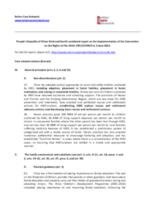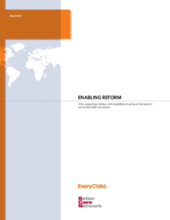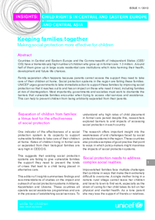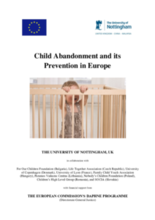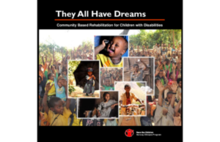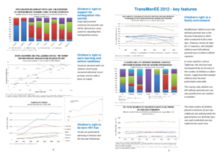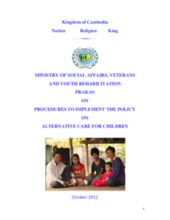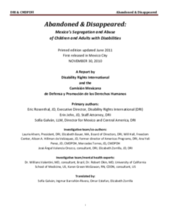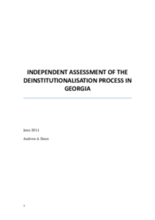Displaying 431 - 440 of 494
The People’s Republic of China issued its third and fourth combined report on the implementation of the Convention on the Rights of the Child in June 2012. This extract of the report focuses on sections relevant to children's care and in particular those addressing Family Environment and Alternative Care
The paper provides a clear agenda for action for reversing the neglect of childhood disability in child care reform and points towards several key policy recommendations.
This edition of Insights produced by UNICEF summarizes the findings and recommendations of studies on the impact and outreach of social protection systems in Albania, Kazakhstan, and Ukraine where high rates of child placement in formal care still persist. The research offers important insight into the weaknesses and challenges faced by social protection systems in the region, but also point to ways in which policy-makers might maximise the impact of social protection systems in order to ‘keep families together’.
This comprehensive manual provides an overview of child abandonment and its prevention in Europe, exploring the extent of child abandonment, possible reasons behind this phenomenon, the consequences of abandonment, and good practices in terms of prevention. For the purposes of the EU Daphne-funded project, child abandonment is defined in two ways, namely open and secret abandonment. Country specific in-depth reviews of child abandonment and its prevention are provided for 10 countries and results from an EU-wide survey analyzed.
The intention of this booklet is to document and share the good practices and results that the Save the Children Norway – Ethiopia (SCN-E) project has achieved at different levels with improved outcomes on the lives of the individual child with disability, families, the community, and institutions.
The Deinstitutionalization Toolkit is designed to provide all those interested in institutional closures and expanded community living opportunities for people with intellectual disabilities and developmental disabilities (ID/DD) with information, strategies, state data, and case studies that can facilitate closure and build community capacity to serve more people with ID/DD in the community. It covers topics such as building a broad-based coalition, understanding and working within the political environment, creating a community system of care, and relevant laws, policies, and court decisions.
TransMonEE is a database that captures a vast range of data on social and economic issues relevant to the situation and wellbeing of children, adolescents and women in 28 countries of Central and Eastern Europe, Commonwealth of Independent States and the European Union. This document includes inter-country comparisons of data on several issues related to children’s care.
This Prakas is intended to define roles and responsibilities of relevant competent agencies and establish procedures, operational guides, and forms to implement the Policy on Alternative Care for Children.
This report is the product of a year-long investigation and collaboration between Disability Rights International (DRI) and the Comisión Mexicana de Defensa y Promoción de los Derechos Humanos (CMDPDH). From August 2009 through September 2010, DRI and the CMDPDH investigated psychiatric institutions, orphanages, shelters, and other public facilities that house children and adults with disabilities.
This independent assessment examined, specifically, the deinstitutionalisation of children in special education boarding schools and child care institutions in the Republic of Georgia.

